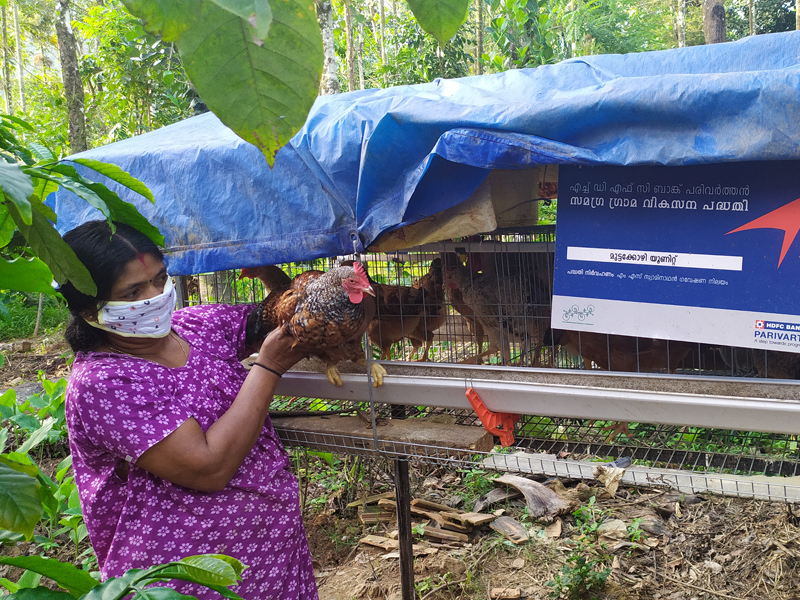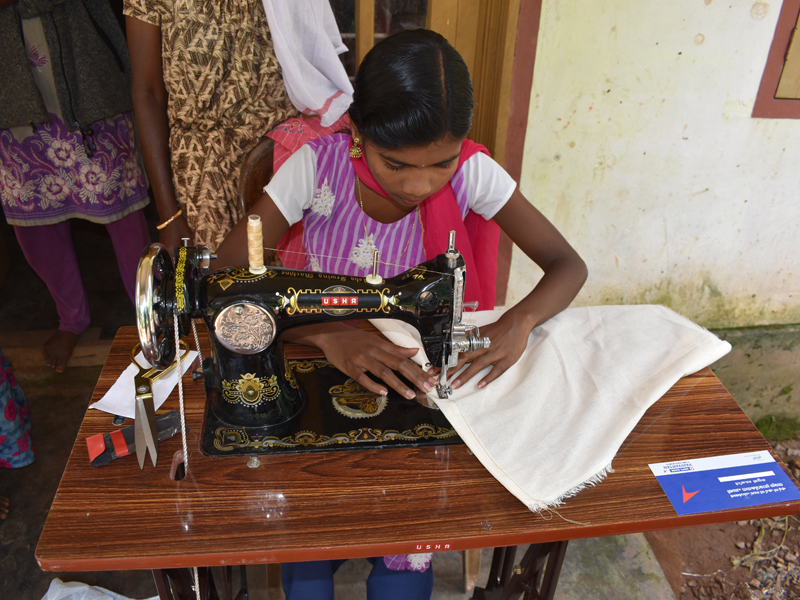Sub programme Area104.
The Foundation is implementing a holistic rural development programme in the Kuttanad region of Kerala comprising Alapuzha, Kottayam and Pathanamthita districts, adjacent districts of Ernakulam and Idukki and in Wayanad. The Kuttanad region is known for below sea level farming and was badly affected by floods in 2018. Other work in Kerala is reported under SPA 203. The ongoing initiative envisions the livelihood development and building of resilience of agricultural and local food systems in 30 flood-affected villages across the six districts by revitalizing ecological balance through community-based natural resource management and improving livelihood opportunities. The programme has been prioritized with three components: (i) natural resources management (NRM); (ii) skill development and livelihood enhancement; and (iii) education.
Natural Resources Management: During the reporting year in Wayanad, 3995 tree saplings suitable for the riverside were distributed and planted on a 5-km stretch on the banks of Cheriyapuzha, one of the major tributaries of Panamaram River, which runs through five project villages in the district – Kottathara, Panamaram, Vengappally, Achooranam and Pozhuthana. A kilometre stretch in each village was also selected for improving vegetative cover to strengthen the banks and thereby minimize soil erosion and landslips. In order to reduce the climate change impact at the micro level by enhancing the vegetative cover in public places, 250 medicinal plant saplings of 50 species were planted in the government Ayurvedic dispensary in each of the five villages.
A training session on NRM was conducted in seven villages across Wayanad, Ernakulam, Idukki and Kuttanad benefitting 221 participants, which included farmers, local self-government departments (LSGDs) and Kudumbashree members. Vegetable seed kits with ten seeds each of brinjal, ladies finger, cabbage, green chilli and tomato have been distributed to 2400 households in Idukki.
School Fruit Gardens: Two hundred saplings of 20 local fruit tree species were distributed and planted in five different schools in Wayanad (AUP School, Sugandhagiri; Achooranam Government Higher Secondary School; St. Antony’s UP School, Vengappally; Government Higher Secondary School, Karinjakunnu, Kottathara; and Government Higher Secondary School, Panamaram). These gardens are linked to the school climate education programme and monitoring systems.
Vegetable Farming: Summer vegetable farming was promoted among seven farmer groups, across five villages in Wayanad, involving 72 women farmers. They are cultivating 13 vegetable crop varieties on 3 acres and marketing an average of 1200 kg of vegetables every month.
Community Conservation Plots of Traditional Rice Varieties in Wayanad: Three community conservation plots for paddy were established in Panamaram, Kottathara and Vengappally villages. The activity implemented in group farming mode with a total of 25 farmers involved distribution of seeds, manure and training for farmers to produce quality seeds. Farmer groups were created and provided with 10 qtl of seeds of seven traditional paddy varieties (Adukkan, Chettuveliyan, Navara, Rakthasali, Valichoori, Kunjithondi and Paalthondi) and trained in the management of conservation plots. The farmers identified Adukkan and Valichoori as suitable varieties for dry regions with sandy soils; and Chettuveliyan and Kunjithondi for the soils characterized by high clay content. Special paddy varieties such as Gandhakasala and Navara, which are of conservation value, were also preferred by the farmers. The seeds cultivated across 23 acres yielded 3.20 tons of quality seeds.
Community Weather Stations: An agro-meteorological unit (in Ramankary village, Alappuzha district) and a hydro-meteorological data acquisition unit (in Thalayazham village, Kottayam district) have been established in the Kuttanad region. These facilities provide useful information about soil, water and crop conditions, which include air, temperature, humidity, wind velocity, wind direction, soil moisture, soil temperature, leaf wetness, solar radiation, rainfall, water level and so on. The data is expected to help farmers to better understand weather conditions and plan their activities accordingly. The dissemination plan is being discussed with stakeholders and the local media.
Skill Development and Livelihood Enhancement: In Idukki district, 680 dairy farmer households were supported with milk bails as an entry-level activity in the dairy sector. Eighty farmer households in Kallara and Vadayar villages of Kuttanad were supported with rubber floor mats for paving cowsheds. These mats were found to be effective in preventing incidence of mastitis and other foot diseases. A WSHG-managed mussel cultivation unit has been promoted in Ernakulam. A total of 80 women farmers of Idukki were provided wheelbarrows for their farm operations. Two women farmer groups in Ernakulam were supported for running a dairy products unit and a 10-ha vegetable farm. Provision of agricultural equipment (paddy transplanter and mono block pumpset) helped 60 paddy farmers in Ernakulam district to continue their farm operations on 40 ha of land. Charka stands with seats were provided to 17 women khadi weavers under the Gandhi Grama Seva Kendram of Ernakulam district to support their livelihoods.
Rain Shelters for Protected Farming of Vegetables: Heavy rainfall over more than 7 months across Wayanad makes vegetable cultivation a seasonal activity, affecting regular consumption of vegetables by households. Rain shelter was introduced as a means to cultivate vegetables throughout the year. MSSRF supported eight tribal families to initiate construction of rain shelters for vegetable cultivation. These shelters were constructed in the homesteads to ensure year-round production of vegetables. Five of them are being utilized for vegetable seedling multiplication and as seed germination chamber and three for farm vegetable cultivation. The rain shelter is also used for producing seedlings of cash crops such as arecanut and pepper. This activity has also helped to increase household consumption of vegetables. One of the beneficiaries, Mr Chandran from Panamaram village, earned Rs 7000 per quarter by producing and selling vegetables and seedlings.
Tailoring as an Alternative Source of Income: Training was provided to 72 women stakeholders across five villages for developing their skills in various aspects of stitching and designing and a sewing machine provided to each: Pozhuthana (14), Vengappally (17), Kottathara (21), Panamaram (13) and Achooranam (7). Tailoring groups formed in Vengappally, Panamaram, and Pozhuthana villages have ensured continuous supply of cloth bags to Organic Eco Shop at Kalpetta. Consultations are on with the GP to develop the units as full-fledged production units.
Poultry Units: To promote poultry as a livelihood option, 15 units with 20–22 birds were started in each of the five villages of Pozhuthana, Achooranam, Vengappally, Panamaram and Kottathara. A total of 9000 ‘gramasree’ egg layer chicks and cages, together worth Rs 600000, were distributed to 75 most deserving families. The surplus eggs after household consumption were aggregated and marketed through the FPO, resulting in an additional source of income for the families.


